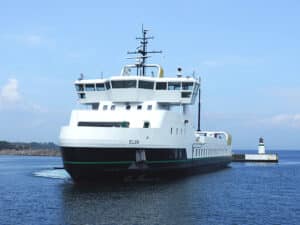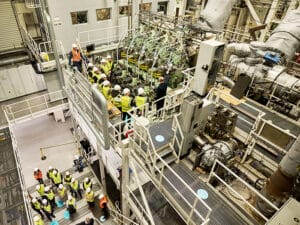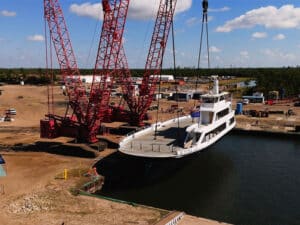
World’s first battery-hybrid self-unloader will have Wärtsilä propulsion system
Written by Nick Blenkey
Ship electrification ecosystem.[Image: © Wärtsilä Corporation]
Wärtsilä is to supply a hybrid-electric propulsion system for the 11,000 dwt battery-hybrid self-unloading limestone carrier recently ordered by Canada’s CSL Group. As we reported earlier, CSL Group will build and operate the vessel under a 20-year strategic partnership with Australia’s Adelaide Brighton Cement Ltd. (Adbri), supporting Adbri’s limestone operations in South Australia with a focus on enhanced efficiency and environmental responsibility.
“Developed in line with CSL and Adbri’s shared decarbonization vision, this groundbreaking vessel will initially run on a hybrid diesel and battery system, replacing 25% of diesel with electric power and lowering Scope 1 emissions by 40% compared to [the vessel that it will replace] Accolade II,” said CSL president and CEO Louis Martel. “By 2031, we aim to run the ship entirely on electric power, further reducing Scope 1 emissions to less than 10%.”
The battery-hybrid self-unloader has been contracted with China’s CCCC Shanghai Equipment Engineering and Jingjiang Nanyang Shipbuilding.
Wärtsilä has been closely involved in developing the concept for the hybrid-electric propulsion system selected to optimize the engine and battery loading for the ship’s operating conditions. The system will provide redundancy when operating in confined waters to improve safety, while at the same time improving efficiency and reducing fuel consumption.
For this vessel, Wärtsilä will supply the whole hybrid electric propulsion system, including generators, DC hub, energy and power management System, main propulsion e-motors, bow thruster e-motors, and the battery solution. Delivery is scheduled for early 2025.
“We require an electrically integrated hybrid-powered propulsion solution from a single-source supplier capable of providing lifecycle support. Wärtsilä was selected for our newbuild project because of their proven ability, experience and track record in delivering high-quality electrification and hybridization systems,” says Frédéric Jauvin, CSL’s vice-president, global technical services.
“Wärtsilä is committed to making decarbonized shipping possible, so we are delighted to be supporting CSL with solutions that enhance the sustainability of their fleet,” says Torsten Büssow, director, electrical & power systems business at Wärtsilä Marine. “This is a short sea shipping vessel that will operate with a lot of maneuvering and variable load profiles, and electrification and hybridization systems are the most efficient for such vessels.”




